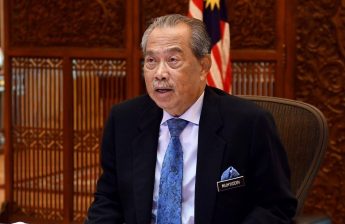KUALA LUMPUR, Dec 9 — The Ministry of Health’s (MOH) new method of consolidating allocations for drugs and medical supplies in its 2021 budget is aimed at making more cost-effective procurements and avoiding delayed payments, Dr Noor Azmi Ghazali said today.
The deputy health minister said presently, MOH uses the current financial year’s allocations to meet its financial obligations from the previous year.
“Improvements in the new budget will enable the Ministry to control and to monitor allocations in a more holistic and efficient manner,” Dr Noor Azmi told the Dewan Rakyat while winding up MOH’s 2021 budget at the committee stage today, on behalf of Health Minister Dr Adham Baba.
“It will help the Ministry optimise financial sources through current procurement methods to make better savings of government allocations in total, for example through pooled procurement.”
Several MPs, including government backbenchers, have questioned MOH’s budget cuts for public health and various health services, including kidney and cancer treatment, and psychiatry.
MOH previously said the allocations for drugs and medical supplies — originally budgeted in 2020 as medical supplies in each respective programme separately: medical, public health, pharmacy services, and dental — have been transferred into two new line items totalling RM4.29 billion under Specific Programmes. These two new line items comprise RM2.89 billion for health facilities’ medical supplies and RM1.4 billion in financial commitment for private concession of medical laboratories and stores – APPL.
Despite Dr Noor Azmi’s explanation today, it is unclear why MOH cannot pursue pooled procurement of drugs through conventional budgeting.
Consolidating funding across programmes for next year effectively means centralising the purchase of medical supplies. Current practice is decentralised, allowing each clinical specialty and hospital to make their own decisions on which and how much treatments to purchase.
It is possible that MOH is making this abrupt and radical budgeting change because certain departments or hospitals may have underspent their annual budgets, while others overspent. However, tighter centralised control could also mean greater restrictions for certain clinical departments to access needed funding, eventually affecting treatments for patients.
MOH’s 2021 Budget Purportedly RM35.8 Billion, Not RM31.9 Billion
Dr Noor Azmi also gave Parliament a convoluted explanation on how the government had actually increased allocations for certain health services, such as general medicine and nephrology. Hang Tuah Jaya MP Shamsul Iskandar Akin earlier cited budget cuts for these two programmes of 14.28 per cent and 77.61 per cent respectively.
The deputy health minister said general medicine received a 1.43 per cent increase in its allocation for next year, as its budget has been supplemented with medical supplies by RM272.073 million. Plus, the tabling of Budget 2021 by the Finance Minister allocated RM6 million on biologics treatment.
“So, it’s an increase.”
Nephrology, according to Dr Noor Azmi, received a 2.33 per cent increase for 2021, when its medical supply of RM201.54 million is taken into account. This, he said, doesn’t include a separate allocation of RM25 million for peritoneal dialysis, which was announced by the Finance Minister during the tabling of Budget 2021.
“So, if we add them up, nephrology is actually RM282.9 million, compared to RM252.1 million for year 2020.”
Dr Noor Azmi also said psychiatry and mental health was actually allocated RM358.2 million for next year, higher than the 2020 allocation of RM344.82 million.
As for certain items with zero allocations in MOH’s Budget 2021, such as clinic support services, the deputy minister said: “When you add back the money, it’s higher than the 2020 allocations”.
Dr Noor Azmi did not specify where this additional “money” could be found in the budget. Opposition MPs told him that they couldn’t find the numbers he cited for the purported increased allocations in MOH’s 2021 budget.
The specific allocations of medical supplies for general medicine and nephrology, as enumerated by the deputy minister, are not listed in the ministry’s budget.
“I don’t see an increase,” Batu Kawan MP Kasthuri Patto said.
During the heated debate on MOH’s budget — which saw Dewan Rakyat Speaker Azhar Azizan Harun slam his gavel three times at one point — Dr Noor Azmi claimed that the total 2021 budget for MOH was actually RM35.82 billion, and not RM31.94 billion.
The RM35.82 billion budget for MOH, he said, includes allocations from the Covid-19 Fund — which is actually governed by a separate piece of legislation from the Supply Bill 2021 that MPs are currently debating — as well as a RM3 billion allocation for Covid-19 vaccines.
“MOH’s allocation is 11.11 per cent of the total federal 2021 budget,” said the deputy minister. “It’s an increase of 0.88 percentage points from the year 2020.”
“This is what I want to say — ‘apa yang tersirat daripada apa yang tersurat’,” Dr Noor Azmi added. [Translation: the hidden from the obvious].
MPs have previously criticised the Perikatan Nasional government for only allocating MOH RM31.9 billion for Budget 2021, comprising 9.9 per cent of the total federal budget of RM322.5 billion. This represents a smaller share compared to the 10.3 per cent allocation for MOH of the overall government’s 2020 budget under the previous Pakatan Harapan administration.
Despite the fractious debate that saw MPs yelling at each other, with Dr Noor Azmi ordering his fellow lawmakers to take a seat, the Dewan Rakyat passed MOH’s 2021 budget at the committee stage with a voice vote.








